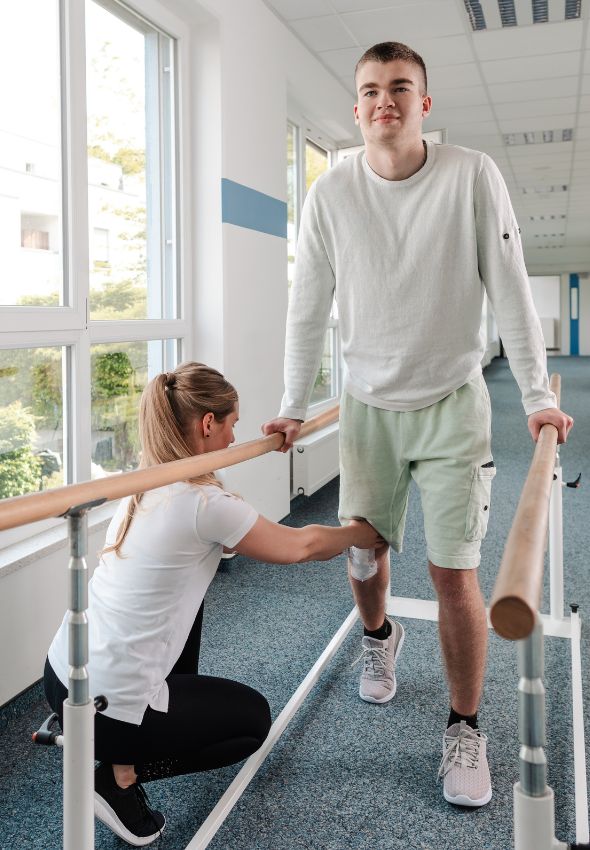Comprehensive Sports Injury Physiotherapy: Your Path to Recovery
Welcome to our invaluable guide on sports injury physiotherapy service. Whether you’re a seasoned athlete or a weekend warrior, injuries can happen. However, with the right rehabilitation approach, you can get back to doing what you love. We will cover everything you need to know about our sports injury physiotherapy, from common injuries to rehabilitation exercises and prevention strategies. So let’s get started!
Understanding Sports Injuries: Best Sports Injury Clinic In BC
While common, sports injuries can happen to anyone, regardless of age or fitness level. They stem from various causes, such as overuse, poor technique, and accidents. By understanding these injuries, you can take control of your recovery journey, empowering yourself to return to your active lifestyle. Common sports injuries include sprains, strains, fractures, dislocations, and tendonitis.
Identifying your type of injury is essential to developing an effective Sports Injury Physiotherapy rehabilitation plan. Depending on severity, sports injuries can be classified as acute or chronic. Acute injuries occur suddenly due to a specific event, such as twisting an ankle or tearing a muscle. On the other hand, chronic injuries develop gradually over time due to repetitive strain on a particular part of the body.
The Role of Physiotherapy in Sports Injury Recovery
Sports injuries can be debilitating and require effective rehabilitation to help you recover. The cornerstone of sports injury recovery is physiotherapy, which focuses on restoring movement and function. Our qualified physiotherapists in Surrey can assess your injury, develop a personalized treatment plan, and guide you through exercises to help you regain strength and mobility.
Physiotherapy techniques in sports injury rehabilitation include manual therapy, electrotherapy, and therapeutic exercises. Manual therapy involves hands-on techniques like joint mobilization and soft tissue massage to reduce pain, improve range of motion, and promote healing. Electrotherapy uses electrical currents to stimulate muscles and encourage tissue repair. Therapeutic exercises are tailored to your specific injury to help you regain strength, flexibility, balance, and coordination.

Benefits of Physiotherapy for Sports Injuries
- Pain relief: Our sports injury Physiotherapy service can help reduce pain and discomfort associated with sports injuries through various techniques, including manual therapy, electrotherapy, therapeutic massage and dry needling.
- Improved mobility: By addressing the underlying cause of your injury and incorporating therapeutic exercises, our Surrey physiotherapy team can help improve your range of motion and restore mobility.
- Faster recovery: Our sports injury clinic can speed recovery by promoting healing and preventing further damage to the injured area.
- Preventing future injuries: This is a crucial aspect of sports injury rehabilitation. Our team of Sports Injury physiotherapists can identify any imbalances or weaknesses in your body that may have led to your injury and work with you to correct them. Taking proactive steps can significantly reduce the risk of future injuries, instilling a sense of responsibility and control over your physical well-being.
- Individualized treatment: Each injury is unique, and our physiotherapists will develop an individualized treatment plan tailored to your specific needs and goals.
- Education and self-management: Our Sports Injury physiotherapists can educate you on proper body mechanics, exercises, and techniques to prevent further injuries and manage existing ones.
- Psychological support: A sports injury can affect one’s physical and mental well-being. At our sports injury clinic, our physiotherapists can provide emotional support and motivation throughout recovery.

Common Sports Injuries: Sport Injury Classification
Some of the most common injuries in sports include ankle sprains, which happen when the ligaments that support the ankle are stretched beyond their limits; hamstring strains, which often result from overextension during physical activity; and ACL tears, a severe knee injury that can cause significant damage to a crucial knee ligament and usually requires surgical intervention and extensive rehabilitation.
01. Sprains (ligament injuries) and strains (muscle/tendon injuries): Overstretching or sudden movements can cause common sports injuries. Physiotherapy can help reduce pain and swelling, improve range of motion, and restore strength to the affected area.
02. Stress fractures: Repeated stress on a specific bone can cause tiny cracks that eventually lead to a fracture. Our sports injury physiotherapy team can identify areas of weakness and provide exercises to improve bone density and prevent further fractures.
03. Tendinopathy: Tendinitis, also known as tendon inflammation, is often caused by overuse or repetitive movements. Physiotherapy can manage pain and restore function through specific exercises and stretching techniques.
04. Concussions: Athletes in contact sports face a severe risk of concussion, a type of traumatic brain injury. Revive Rehab Physiotherapists can guide exercises to improve balance and coordination, monitor progress, and ensure a safe return to play.
05. Dislocations: This condition occurs when the bones in a joint become separated. Sports Injury Physiotherapy treatments can strengthen the muscles around the joint, preventing dislocations and improving stability.
06. Bursitis: Inflammation of the bursa, a sac cushions joints, can cause pain and limited motion. Sports Injury Physiotherapy can help decrease inflammation and restore function through exercises and manual therapy.
07. Tennis elbow/golfer’s elbow: When the tendons in the elbow become inflamed, they cause common overuse injuries. Our sports injury Physiotherapy experts can help identify contributing factors and provide specific exercises to reduce pain and strengthen the affected area.
08. ACL tear: ACL tears are a common injury among athletes. Sudden stops usually cause them to change direction during sports activities. Sports Injury Physiotherapy can help stabilize the knee and guide the individual through a safe and effective rehabilitation program.
09. Rotator cuff tear: A rotator cuff tear is a condition in which one of the muscles or tendons supporting and moving the shoulder joint is torn. Sports Injury Physiotherapy can help improve shoulder range of motion, strength, and stability through specific exercises and manual therapy techniques.
10. Plantar fasciitis: The plantar fascia is a thick tissue band connecting the heel to the toes. Inflammation of this tissue can cause foot pain and stiffness. Our Sports Injury Physiotherapy treatments can help reduce inflammation, increase flexibility, and strengthen the muscles in the foot and ankle, thereby alleviating symptoms.
Sports Injury Rehabilitation Exercises : Ways A Physiotherapist Can Treat Your Sports Injury
Strengthening Exercises
These exercises are designed to help rebuild muscle strength that may have been lost during inactivity following an injury. They gradually increase in intensity to safely challenge the muscles and promote recovery.
Flexibility Exercises
Flexibility exercises are designed to gently stretch and lengthen the muscles and tendons that may have become tight or shortened due to an injury. The primary goal of these exercises is to restore the range of motion, which is essential for preventing future injuries and ensuring that the full range of motion is maintained.
Balance and Coordination Exercises
Athletes often lose their sense of balance and coordination after an injury. These exercises are designed to help them improve their proprioception, enabling them to return to their pre-injury performance levels while reducing re-injury risk.
Functional Training
As athletes recover from their injuries, functional training exercises that imitate the movements and activities of their specific sport are introduced. This approach guarantees that athletes can perform at their best once they return to their sport. The focus is on proper techniques and strategies to prevent injuries.
Incorporating these exercises into a Sports injury rehabilitation program, under the guidance of our Sports injury clinic, ensures a comprehensive approach to sports injury recovery, addressing all aspects of the injury and paving the way for a triumphant return to sport.
Recovery Timeline
The amount of time it takes to recover from a sports injury differs based on the type and severity of the injury. Typically, the recovery progresses from managing the acute phase of the injury to returning to play. Throughout the recovery, various goals and milestones are set to track progress and adjust the treatment plan accordingly.
Prevention Strategies
Reducing the risk of sports-related injuries is possible by taking specific measures, although injuries can still occur.
- Proper warm-up and cool-down routines before and after exercise
- Cross-training to improve overall fitness and reduce overuse injuries
- Using appropriate protective gear and equipment
- Listening to your body and avoiding overtraining or pushing through pain
Nutrition and Hydration
Nutrition and hydration are essential for supporting recovery after a sports injury. Consuming a balanced diet rich in nutrients and staying hydrated can significantly aid tissue repair and reduce inflammation. Fueling your body with the proper nutrients is crucial to ensure optimal recovery and performance.
Return to Play Protocol
When an athlete faces an injury, they should gradually return to sports activities with the guidance of a healthcare professional. Clearance from a physiotherapist or sports medicine doctor is mandatory before resuming total activity. Functional testing is also crucial in the return-to-play protocol to ensure the athlete’s safety.
FAQs For Sports Injury Physiotherapy
A: Sports injury physiotherapy is a specific area of physiotherapy that concentrates on preventing, evaluating, managing, and rehabilitating injuries related to sports and exercise. Sports Injury Physiotherapy services use a combination of manual therapy techniques, therapeutic exercises, and modalities to assist athletes in recovering from injuries and regaining their pre-injury level of function.
A: It is recommended that you seek a physiotherapy clinic for sports injuries immediately after experiencing pain or injury during sports or exercise. Taking early action can prevent further damage, reduce inflammation and pain, and speed up recovery.
A: When you have a sports injury and go for physiotherapy, our physiotherapists will comprehensively evaluate your injury. This will include reviewing your medical history, performing a physical examination, and possibly ordering diagnostic tests such as imaging studies. Based on their assessment, our sports injury Clinics in Surrey and Abbotsford will create a personalized treatment plan tailored to your needs and goals.
A: Sports injury physiotherapy may involve a variety of treatments, including:
- Manual therapy techniques such as joint mobilization, soft tissue massage, and stretching
- Therapeutic exercises to improve strength, flexibility, and range of motion
- Modalities such as ultrasound, electrical stimulation, and heat or ice therapy
- Education on injury prevention, activity modification, and proper biomechanics
A: The time required for sports injury rehabilitation varies based on factors such as the type and severity of the injury, individual healing rates, and adherence to the treatment plan. The Sports Injury rehabilitation process may typically last from several weeks to several months, with our physiotherapist monitoring progress regularly.
A: In most cases, our physiotherapist will advise you on which activities are safe to perform and which should be avoided or modified during rehabilitation. Following their guidance to prevent further harm and promote optimal healing is crucial.
A: Sports injury physiotherapy focuses on preventing injuries. Our physiotherapist can guide you on proper warm-up and cool-down routines, strength and flexibility exercises, techniques, and equipment selection to lower your risk of injury during sports and exercise.
A: After an injury, it’s important to gradually return to sports under the guidance of a physiotherapist or sports medicine professional. They will assess your readiness based on factors such as pain levels, functional abilities, and performance on functional tests. Rushing the return to play process can lead to re-injury, so it’s crucial to take the necessary time to recover fully.
A: If you’re looking for a physiotherapist to help you recover from a sports injury, finding one who specializes in sports injury rehabilitation or has experience working with athletes is a good idea. You can ask your primary care physician, sports medicine doctor, or athletic trainer for recommendations or search online for physiotherapy clinics that offer sports injury services. It’s essential to verify their credentials and experience before scheduling an appointment.
A: Health insurance plans may cover sports injury physiotherapy in some instances. However, the extent of coverage depends on your specific insurance policy and the severity of the injury. It is advisable to check with your insurance provider to understand your coverage options, direct billing, and any out-of-pocket expenses you may have to bear.
